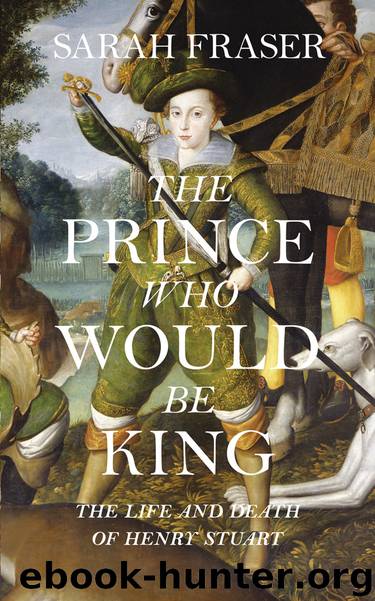The Prince Who Would Be King by Sarah Fraser

Author:Sarah Fraser [Fraser, Sarah]
Language: eng
Format: epub
Published: 2017-11-07T05:00:00+00:00
On mainland Europe, events sped ahead of James’s intentionally glacial diplomatic pace. By April 1610, Maurice of Nassau and Henri IV of France had mustered thousands of troops to march on Jülich-Cleves. With or without the Stuarts, they must force Archduke Leopold out of Jülich and deter the Spanish Habsburgs from interfering.
English soldiers and diplomats in Holland queried James’s reluctance to let them join the Franco-Dutch force. The consensus in Holland was that delays gave Leopold ‘a great deal too much time’ to secure himself in Jülich. Lack of instruction from London ‘may protract the Cleves business while our King is amused by’ his favourites, the lively young German princes, and marriage proposals for his two older children. ‘It is now time for action not deliberation,’ they snapped.
Dutch deputies ‘bound for France passed Brussels in great lustre, but those sent for England make little show’. Henry badly wanted command of a British force. He ‘was athirst for glory if ever any Prince was. He lent fire to the king in the affairs of Germany, and aspired to be head of the confederate Princes’, of the union, ‘who include fourteen of the Hanseatic towns’. Since Henri IV signed his military pact with the Evangelical Union the previous winter, Henry had been even more impatient to go. His ‘barriers’ at the beginning of the year, were, in part, Henry communicating his readiness, both at home and abroad.
At last, at the end of April, James agreed to commit English troops to the campaign. Henry waited for his call to arms from his father. The king gave the command to … Sir Edward Cecil. Henry was not to re-enact the bloody heroics of the Black Prince and Henry V, cited in his ‘barriers’, after all. Not yet.
Sir Edward now mustered 4,000 English and Scots troops to join Maurice and Henri IV, and promised to write to Henry continually.
Salisbury sent a man ‘to take order to furnish [William] the Lord Cranborne with all necessaries to follow the French King in this journey’. He hoped it would endear his son to Henry. In England, ‘more of our court gallants talk of taking the same course if the voyage hold’, said Salisbury. It must have galled Henry no end. Salisbury wished them God speed. Better, he muttered that ‘they had some place abroad to vent their superfluous valour, than to brabble so much as they do at home; for in one week we had three or four great quarrels’. Salisbury did not explain what the problem was, but Southampton, a Henry man, and Montgomery, an old favourite of James’s, came to blows on the tennis court, ‘where the rackets flew about their ears’.
By the beginning of May, Protestant Europe and France were ready to march, ‘[which] I fear will draw all Christendom into the quarrel’, the English ambassador in Paris concluded grimly. Sir Ralph Winwood wondered, in all honesty, ‘what should move the French King to engage himself so far in a business that no more concerns
Download
This site does not store any files on its server. We only index and link to content provided by other sites. Please contact the content providers to delete copyright contents if any and email us, we'll remove relevant links or contents immediately.
Fanny Burney by Claire Harman(26591)
Empire of the Sikhs by Patwant Singh(23069)
Out of India by Michael Foss(16842)
Leonardo da Vinci by Walter Isaacson(13305)
Small Great Things by Jodi Picoult(7112)
The Six Wives Of Henry VIII (WOMEN IN HISTORY) by Fraser Antonia(5493)
The Wind in My Hair by Masih Alinejad(5085)
A Higher Loyalty: Truth, Lies, and Leadership by James Comey(4946)
The Crown by Robert Lacey(4802)
The Lonely City by Olivia Laing(4796)
Millionaire: The Philanderer, Gambler, and Duelist Who Invented Modern Finance by Janet Gleeson(4457)
The Iron Duke by The Iron Duke(4345)
Papillon (English) by Henri Charrière(4251)
Sticky Fingers by Joe Hagan(4185)
Joan of Arc by Mary Gordon(4092)
Alive: The Story of the Andes Survivors by Piers Paul Read(4017)
Stalin by Stephen Kotkin(3955)
Aleister Crowley: The Biography by Tobias Churton(3628)
Ants Among Elephants by Sujatha Gidla(3458)
